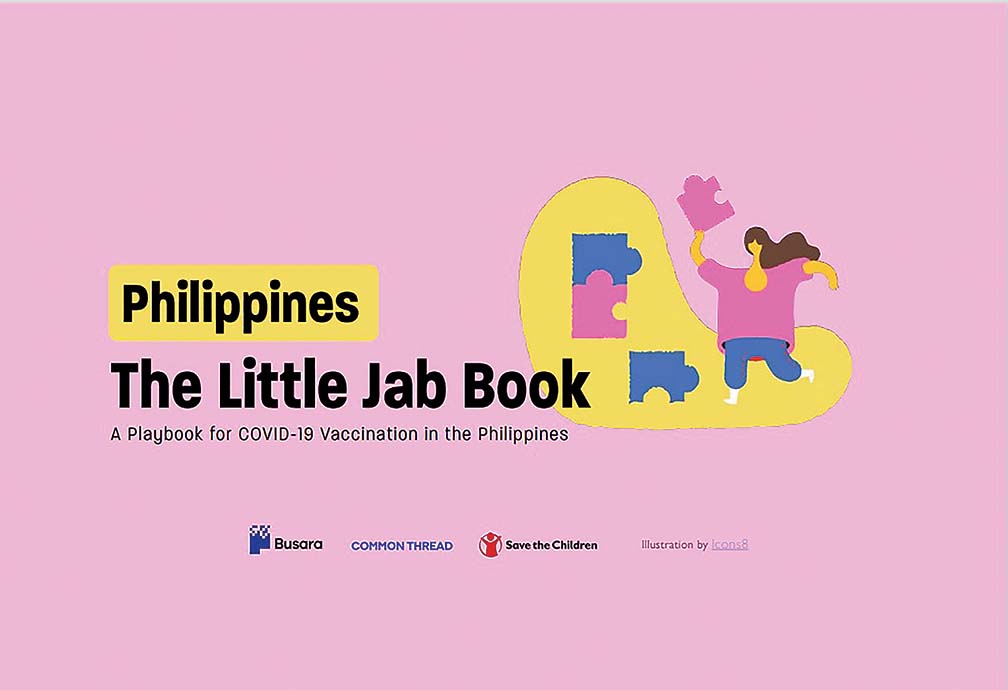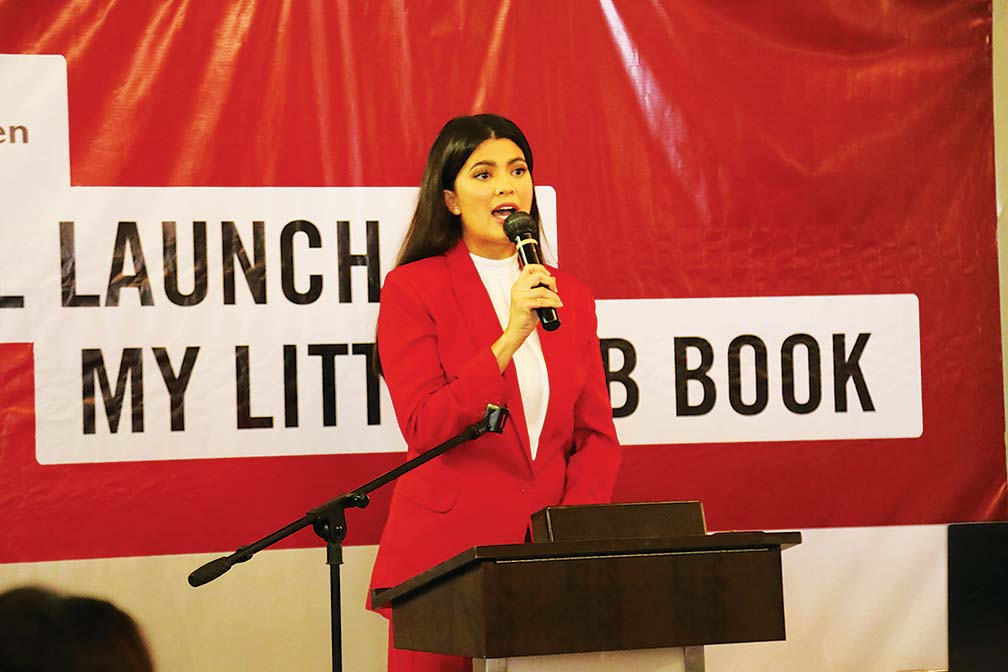Vaccination is so far the best weapon against the COVID-19 virus that has been hogging the headlines for the past two years. However, as of Feb. 9, data from the Department of Health (DOH) indicated that approximately 60 million Filipinos have completed the two COVID-19 vaccine doses while around eight million have received their booster shots.
This is short of the 70% needed to declare herd immunity against the virus in the entire country. This has also put a strain on the country’s health services and left millions of children unable to get routine vaccines against deadly diseases.
To address this, Save the Children, the world’s leading independent children’s organization, has joined forces with Busara Center for Behavioral Economics, and Common Thread to find out why Filipinos have shied away from getting the COVID-19 vaccines. This led to the creation of the “Little Jab Book Philippines,” the first practical guide aimed at fighting COVID-19 vaccine hesitancy using behavioral science.
BOOK LAUNCH

The ”Little Jab Book Philippines” was officially launched during a simultaneous face-to-face and online event at the Novotel in Cubao last Feb. 23.
The Busara Center for Behavioral Economics is a research and consulting firm that applies and advances behavioral science to address the most challenging development problems in India and across Africa. Common Thread, on the other hand, finds human-centered solutions to the world’s toughest public health problems.
“We know that ensuring more than 80% of the population gets vaccinated is one of the best measures to protect Filipinos from the ongoing pandemic. Trust in vaccination will also help ensure that vulnerable children get their protection from COVID-19 and other deadly vaccine-preventable diseases,” said Albert Muyot, Save the Children’s CEO in the Philippines.
“But an increased supply of COVID-19 vaccines hasn’t necessarily translated into more jabs. In fact, our research shows that particular barriers in the Philippines stop many from getting their COVID-19 vaccine, even if they know it’s the best tool to fight the virus. That’s where the ‘Little Jab Book’ comes in as it provides concrete and practical solutions to getting as many Filipinos vaccinated as possible, so that our health services can get back to delivering other life-saving services interrupted by the pandemic, including routine child immunizations,” Muyot added.
STRAINED HEALTH SERVICES
Allison Zelkowitz, Director of Save the Children’s Center for Utilizing Behavioral insights for Children (CUBIC), pointed out that COVID-19 has strained health services and devastated economies around the world and has had far-reaching impacts on live-saving child immunization programs.
“With vaccines now more widely available, we need to identify and understand what stops people from getting vaccinated and engage with that in a practical way. If we don’t understand why they’re hesitant—whether that’s because of inconvenience, specific doubts, or a lack of important endorsements—the vaccines may not reach enough people. If uptake isn’t as good as it needs to be, children and families will continue to suffer,” she said.
In-depth interviews with parents and a survey of more than 600 people in Malabon City in Metro Manila and Sarangani Province in southern Mindanao revealed three main obstacles to getting vaccinated: people do not trust the COVID-19 vaccines; people underestimate the severity of COVID-19; and people are discouraged by long wait times and uncertainty about vaccine availability.
“People may be hesitant to get vaccinated due to a fear of vaccine side effects, a lack of confidence in the vaccine, the strong negative impact of the Dengvaxia campaign or erroneous beliefs generated by rumors and misinformation,” the book said.
COVID-19 AS LOW RISK
Additionally, people do not want to get vaccinated because they think “COVID-19 is low risk and no different from mild colds, coughs.” Others also believe that they will be able to overcome COVID-19 due to their youthfulness or good health.
“People who want to get vaccinated, on the other hand, do not follow through on their intention to get vaccinated because of a lack of understanding of the vaccination registration process, long waiting times and hearing about others being turned away due to vaccine unavailability,” it said.
The handbook provides practical and adaptable solutions to help health workers, government authorities and non-government organizations increase vaccine uptake.
To deal with people who do not trust the COVID-19 vaccine, the Little Jab Book suggests the activation of rumor warriors that would counter vaccine rumors among the youth. It also suggested that the vaccine complements traditional medicine.
“It would also be helpful to promote testimonials from newly converted vaccine supporters and provide transparency around vaccine development by screening short films on vaccine history,” the book said.
ENJOYABLE REGISTRATION PROCESS
For people who underestimate the severity of COVID-19, the book suggests the registration process for the vaccine should be made enjoyable. If possible, use gamification to clarify the risks of COVID.
“Sending personalized requests from health workers in their communities would also help leverage the people’s sense of altruism,” it said.
As for people who are discouraged by the long wait times and uncertainty about vaccine availability, it is suggested that vaccine registration should be made available in common places and that it should be coupled with other social services.
“It is also important to provide up to date information about vaccine availability through eye-catching reminders in public places. Follow through should also be encouraged by highlighting visible commitments to vaccination,” the book said.
Aimed at low- and middle-income countries, the global version of the “Little Jab Book” was published in 2021 and has led to the development of several country-specific versions with Nepal and Kenya due to launch their own practical guides soon.
The US Center for Disease Control’s (CDC) own COVID-19 uptake handbook also drew inspiration from this global initiative, showing the global potential of these practical strategies.





